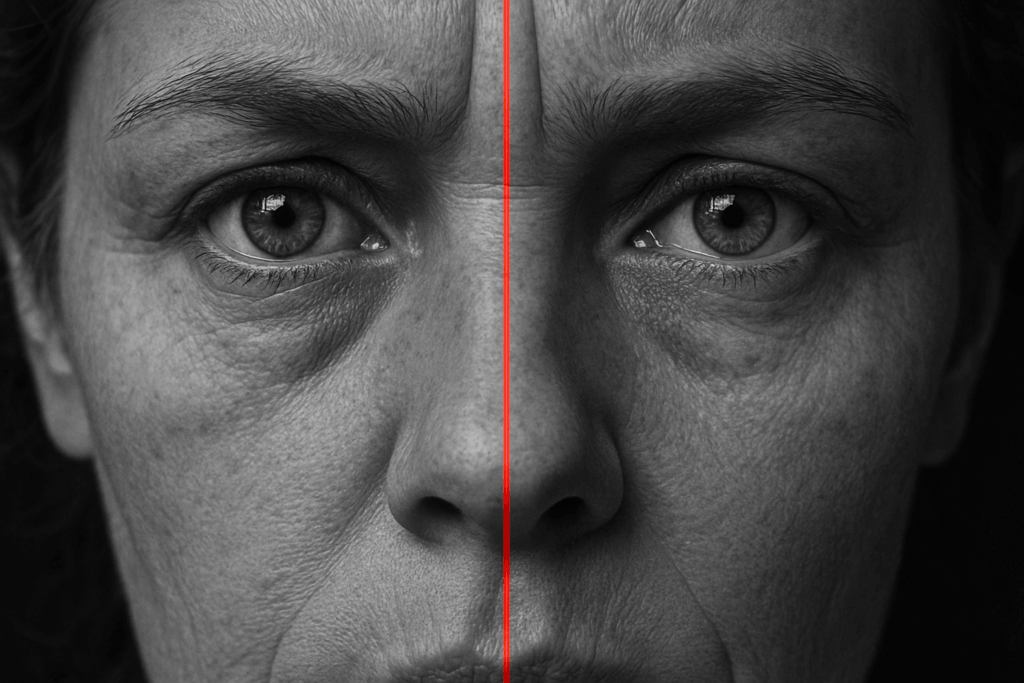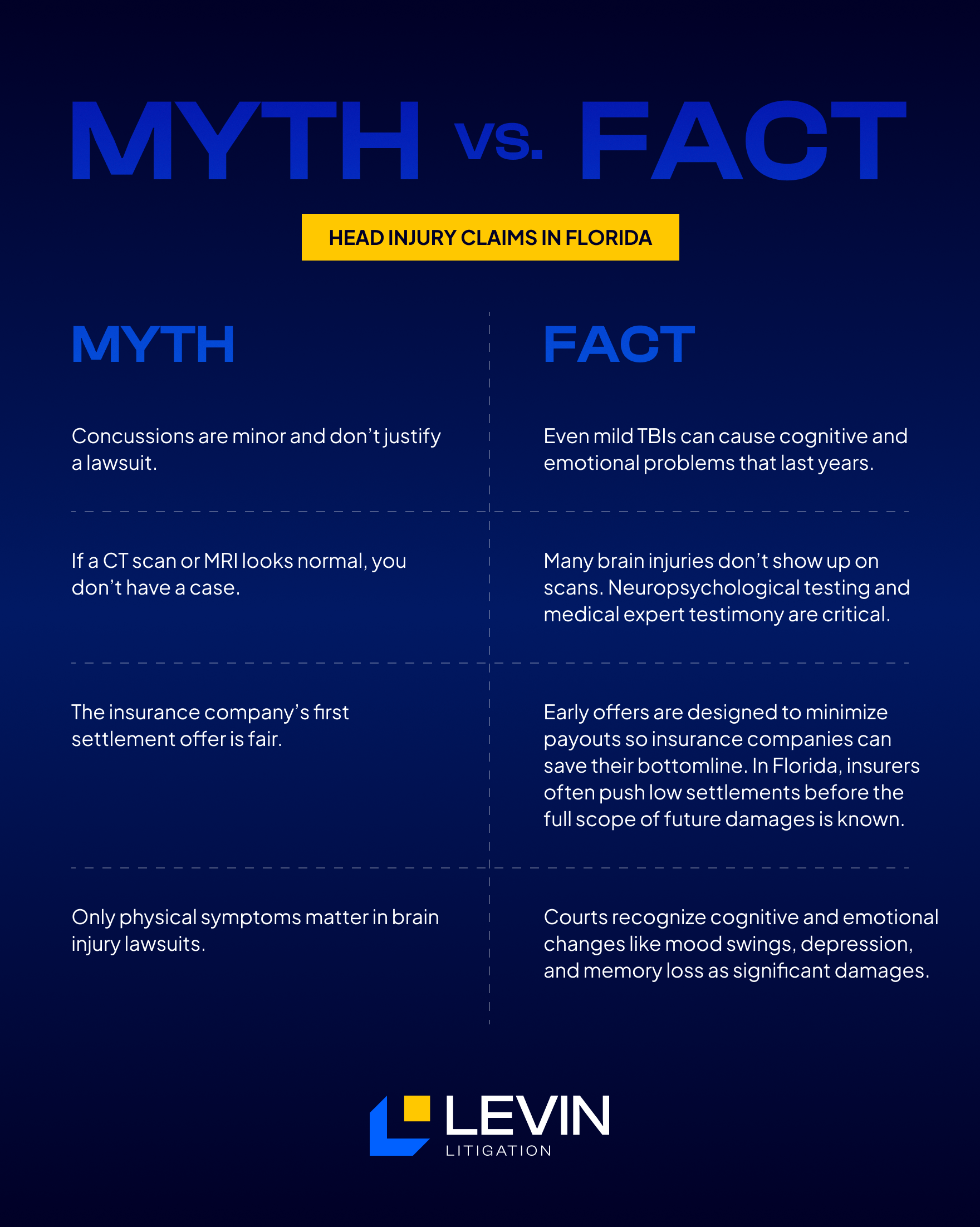Table of Contents
Head injuries are among the most devastating consequences of accidents in Florida. Whether caused by a high-speed crash on I-95, a slip in a Broward County grocery store, or a fall at a construction site in Hollywood, the effects can last a lifetime. Personal injury victims often face extensive medical treatment, lost wages, and emotional strain. Filing a claim or lawsuit helps mitigate these financial burdens so they don’t fall solely on the injured person and their family.
At Levin Litigation, we want you to know exactly what filing a head injury claim entails, because it’s not like other types of injury claims. These cases hinge on complex medical proof, and they generally require aggressive insurance negotiations. Contact us for a free consultation.
Quick Answer: What Are Head Injury Claims?
If you or a loved one has suffered a head injury due to someone else’s negligence, we know that rebuilding your life involves far more than medical bills. These injuries often hide under the surface (with symptoms that can emerge later) and require expert testimony, advanced testing, and detailed valuation of future damages to prove your case. Without an attorney who understands how insurers fight to downplay or discredit these claims, you risk accepting less than you deserve or missing critical deadlines.
Understanding Head and Brain Injuries
Not all head injuries are the same, and their impact can vary dramatically. In Florida personal injury law, most claims involve traumatic brain injuries (TBIs), but acquired brain injuries (ABIs) are also compensable when caused by negligence.
Common, though serious, head and brain injuries include:
- Concussion. Often classified as a mild TBI, but the word “mild” is misleading. Victims may experience memory issues, light sensitivity, and chronic headaches. Florida ERs such as Broward Health Medical Center frequently discharge concussion patients only after follow-up care is arranged, since delayed symptoms are common.
- Contusion. A bruise on the brain tissue itself, usually caused by a direct blow. In serious cases, Florida neurosurgeons may need to remove clotted blood to relieve swelling.
- Diffuse axonal injury. Caused by violent movement of the head, such as in a rollover crash on Florida’s Turnpike. These injuries tear the brain’s nerve fibers, often leading to coma or long-term disability.
- Cerebral edema. Swelling of the brain, which increases intracranial pressure and can be fatal if untreated. Craniectomy surgery, or removing part of the skull to allow the brain to expand, is sometimes performed in Florida trauma centers.
- Penetrating injury. When an object pierces the skull. These cases are often catastrophic, with a high risk of infection and permanent impairment.
- Acquired brain injuries (ABIs). Caused by oxygen deprivation, stroke, or medical negligence such as anesthesia errors.
How Doctors Measure Severity of the Injury
Florida physicians use the Glasgow Coma Scale (GCS) to score eye, verbal, and motor responses after an accident. Scores range from mild (13–15) to moderate (9–12) to severe (3–8). In rehab settings, providers may use the Rancho Los Amigos Levels of Cognitive Functioning to track recovery, especially for patients in long-term facilities like Jackson Memorial’s brain injury unit.
The classification of severity often determines not just medical treatment, but also how damages are calculated in court.
Common Causes of Head Injuries in Florida
Every year, thousands of people suffer brain injuries due to negligence. The most common causes of head trauma in Florida include:
- Car, truck, and motorcycle accidents. South Florida’s dense traffic and high-speed corridors (I-95, Florida’s Turnpike, US-1) are hotspots for severe crashes. Motorcyclists, in particular, face a high risk of catastrophic TBIs.
- Slip and fall accidents. Hotels, restaurants, and shopping centers must keep premises safe. Falls on wet floors or broken pavement can lead to serious head trauma.
- Workplace accidents. Construction remains one of Florida’s fastest-growing industries. Falls from scaffolding, crane accidents, or falling debris regularly cause life-altering head injuries.
- Dog bites. Florida has one of the highest dog ownership rates in the country, and attacks are a frequent cause of traumatic head injuries. Victims may be knocked down, struck against pavement, or directly bitten on the face or skull, often leaving lasting physical and psychological damage.
- Sports and assaults. Florida’s active sports culture, from high school football to recreational boating, adds another layer of risk. Assaults in bars or public spaces also contribute to the caseload.
Head Injury Symptoms: How Can You Tell If Your Brain Is Damaged?
Head injuries are deceptive. Victims may walk away from a crash, fall, or workplace accident appearing fine, only to experience serious problems hours or even days later. Delayed onset is common, which is why Florida trauma centers like Broward Health and Memorial Regional should keep patients under observation after accidents.
Physical Symptoms
Head injuries can trigger a wide range of physical issues, which may surface immediately or develop gradually:
- Persistent or worsening headaches
- Dizziness and problems with balance, which can make everyday activities dangerous
- Nausea and vomiting
- Vision problems, such as blurred or double vision
- Sensitivity to light and sound, which can make environments like schools or workplaces difficult
- Seizures in severe cases, particularly with penetrating injuries or swelling
Cognitive Symptoms
Brain injuries often affect how the brain processes and stores information. Victims may experience:
- Short- or long-term memory lapses
- Confusion and disorientation, including trouble recognizing familiar people or places
- Difficulty concentrating, which interferes with work or academics
- Slurred speech or difficulty finding words
- Trouble with executive function, such as planning or organizing tasks
Emotional and Behavioral Symptoms
Because the brain regulates mood and behavior, injuries often cause emotional fallout, including:
- Mood swings that seem out of proportion to events
- Depression and anxiety, even in people with no prior history
- Irritability or aggression, straining family and workplace relationships
- Impulsivity or risky behavior that wasn’t present before the injury
Hidden Symptoms That Victims Often Overlook
Some brain injury symptoms in adults don’t appear right away and may be dismissed as stress or unrelated issues – yet they’re closely tied to head trauma. These hidden effects often become central in Florida head injury claims:
- Sleep disturbances. Insomnia, excessive daytime sleepiness, or irregular sleep patterns
- Sensory changes. Ringing in the ears (tinnitus), changes in smell or taste, or hypersensitivity to touch
- Hormonal imbalances. Damage to the pituitary gland can disrupt metabolism, growth, or mood
- Chronic fatigue. Exhaustion that doesn’t improve with rest
- Difficulty with multitasking. Simple daily routines like cooking or driving become overwhelming
Because these symptoms are subtle and develop over time, they are easy for insurers to dismiss. Detailed medical follow-ups, symptom journals, and neuropsychological testing are often required to prove their connection to the injury.
Special Considerations for Children
Children are especially vulnerable to long-term consequences of head trauma because their brains are still developing. A concussion that looks minor can worsen over time and interfere with:
- Academic performance (difficulties with attention, reading comprehension, or math)
- Emotional regulation (tantrums, frustration, or social withdrawal)
- Impulse control (risk-taking behavior or poor decision-making)
Florida pediatric neurologists emphasize the importance of follow-up visits after sports injuries, playground accidents, or falls. Even a single concussion can have lasting effects on a child’s cognitive growth and emotional well-being. Parents are often urged to keep symptom journals and share them with pediatricians for ongoing monitoring.

Diagnosis in Florida Head Injury Cases
Because head injuries are complex, diagnosis typically involves multiple layers of testing:
- CT scans and MRIs.These are standard at Florida emergency rooms for detecting skull fractures, hemorrhages, or swelling
- Neuropsychological testing. Cognitive exams that assess memory, attention, and processing speed. These tests often reveal deficits that imaging misses
- Functional imaging. Advanced facilities such as UF Health Shands or Jackson Memorial may use PET scans or functional MRIs to show how the brain is working in real time
- Longitudinal evaluation. Repeated testing over months or years helps confirm whether symptoms persist and how they impact daily life
Diagnostic records form the backbone of a Florida brain injury lawsuit. Insurers routinely argue that symptoms are exaggerated or unrelated to the accident. Without CT scans, cognitive testing, and ongoing medical documentation, victims are more vulnerable to these defenses. Conversely, thorough records from Florida hospitals, neurologists, and rehabilitation specialists create a clear link between the accident and the long-term damage.
Head Trauma Beyond Brain Injury
Not every serious head injury involves direct damage to the brain itself. Trauma to the skull, face, or sensory organs can be equally life-altering and often comes with its own set of medical and emotional challenges.
- Facial fractures and disfigurement. Broken jaws, cheekbones, or orbital bones are common in South Florida car crashes and assaults. Surgical reconstruction may leave visible scarring.
- Vision loss and eye injuries. Blunt trauma can detach retinas or rupture the eye. In severe cases, surgical removal (enucleation) may be required.
- Craniectomy and skull loss. To relieve brain swelling, Florida neurosurgeons may remove part of the skull. These patients face a heightened risk of infection until reconstructive surgery can be performed.
- Infection risk. Any time the skull is fractured or opened, patients are more vulnerable to meningitis or abscesses, which can further complicate recovery.
- Psychological toll. Beyond physical function, visible disfigurement or loss of an eye often leads to depression, anxiety, and social withdrawal.
These conditions are just as relevant in a Florida head injury claim as brain trauma itself. They add layers of both economic damages – like medical expenses, surgeries, and ongoing care – and non-economic damages, such as emotional suffering and diminished quality of life.
The Legal Basis for a Head Injury Claim in Florida
Florida law allows injured people to seek compensation when another party’s negligence causes harm. To succeed, a plaintiff must prove:
- Duty of care, e.g., drivers must operate safely, property owners must maintain premises, doctors must follow accepted standards.
- Breach of duty, such as reckless driving, failing to clean a spill, or misdiagnosing a condition.
- Causation, the breach directly led to the head injury.
- Damages like medical bills, lost wages, pain and suffering.
Two Florida-specific considerations matter:
- Comparative negligence. Florida follows a modified contributory fault system. If you are found more than 50% at fault, you cannot recover damages. Defense attorneys and insurers often push this angle in brain injury cases.
- Statute of limitations. Most personal injury claims must be filed within two years of the accident. Missing these deadlines can often end a case before it starts.
Proving a Head Injury Claim in Florida
Unlike a broken arm that shows up clearly on an X-ray, head and brain injuries are often invisible. That makes proving these claims uniquely challenging. In Florida courts, juries need more than a victim’s word; they require objective, medically grounded evidence linking the accident to long-term effects. A strong case typically draws from several categories of evidence:
- Medical records. ER notes, CT scans, MRI reports, and neurology follow-ups document the immediate injury and ongoing symptoms.
- Accident documentation. Police reports, workplace incident logs, or witness statements establish the cause of injury and liability.
- Expert testimony. Neurologists can explain prognosis, vocational experts can measure lost earning capacity, and life-care planners can calculate future medical costs.
- Neuropsychological evaluations. These tests identify deficits in memory, concentration, and problem-solving that standard imaging often misses.
Florida insurers routinely challenge brain injury claims by suggesting symptoms are:
- The result of stress, age, or unrelated health conditions.
- Subjective complaints without objective proof.
- Temporary, especially in cases labeled as “mild concussions.”
Without thorough documentation, these arguments can be persuasive to juries unfamiliar with the complexities of brain injuries.
Because many brain injuries are microscopic and diffuse, imaging alone might not be enough. Modern tools, such as functional MRIs, PET scans, and diffusion tensor imaging, can show how the brain is working, but they should be paired with neuropsychological data and expert interpretation. Detailed care plans from Florida rehabilitation specialists also help demonstrate how symptoms will affect a victim’s daily life for years to come.

Head Injury Compensation Payouts
The value of a brain injury claim depends on far more than immediate medical bills. Florida law allows recovery for both economic and non-economic damages.
Economic damages:
- Emergency care, hospitalizations, surgeries
- Long-term rehabilitation, physical therapy, speech therapy
- Lost wages and reduced earning capacity
- Modifications to homes or vehicles for disability
Non-economic damages:
- Pain and suffering
- Loss of enjoyment of life
- Emotional distress, strain on family relationships
Future damages: Because many brain injuries are permanent, a brain injury lawyer can help negotiate the dollar value of your potential future costs. A young accident victim in Florida may require decades of therapy, assisted care, and lost earning potential, often adding millions to a settlement. An experienced attorney understands this and knows how to put the best argument forward to secure your future expenses.
How To File an Injury Claim
Filing and pursuing a head injury claim in Florida typically follows these steps:
- Seek immediate medical attention, both for health and documentation.
- Report the incident to the police, notify an employer, or document a property hazard.
- Consult an attorney so you can preserve evidence and meet filing deadlines.
- Gather documentation like your medical records, expenses, witness statements, and anything else you have.
From there, your attorney can:
- File a claim against the negligent party’s insurance.
- Negotiate a better settlement award.
- File a complaint (AKA, lawsuit) with the court if the insurers won’t play ball.
- Take your case to a jury in a trial in a Florida court.
Because brain injuries often have delayed or evolving symptoms, many cases take months or years to resolve. Settling too early risks leaving future expenses uncovered.
Florida Head Injury Claim: Why Attorney Experience Matters
Not every lawyer can handle the medical and legal complexities of a brain injury case. What makes the difference is targeted experience, particularly with insurance companies that are trained to minimize payouts. Levin Litigation’s background in the insurance sector gives the firm a unique ability to anticipate and counter these tactics.
- Anticipating Insurance Attacks on Medical Proof. Insurers are quick to argue that symptoms are exaggerated, stress-related, or unrelated to the accident – especially when imaging looks normal. Our attorneys know which medical records could be targeted, which testing will likely be dismissed as “subjective,” and which expert reports are most likely to withstand cross-examination.
- Deploying the Right Experts at the Right Time. Florida brain injury cases often require neurologists, neuropsychologists, vocational experts, and life-care planners. We know from experience which expert opinions are accepted as credible.
- Valuing Claims With Future Damages Built In. Insurance adjusters are trained to undervalue long-term care, rehabilitation, and loss of earning potential. Attorneys with insurance backgrounds understand those calculations – and the formulas used to justify low offers. We use that same knowledge to highlight the hidden costs of a brain injury, from multiple surgeries to decades of therapy, helping make sure you do not settle for less.
Florida Head Injury Claims: FAQs

How much is a brain injury case worth in Florida?
Brain injury compensation payout depends on the exact circumstances of your case. Mild TBIs may bring tens of thousands, while catastrophic injuries with lifelong care needs can reach millions.
How long do head injury claims take?
Brain injury lawsuits might take anywhere from several months to years, depending on medical stability, the peculiar nature of the lawsuit, and whether insurers fight liability.
What should I avoid after a brain injury?
Ignoring symptoms, delaying medical care, returning to strenuous activities, or accepting early settlement offers without review are some of the things you should avoid after a brain injury. However, please check with your brain surgeon or doctor about specific aftercare.
Pursuing a Head Injury Claim in Florida? Call Levin Litigation
A head injury can alter the course of your life, but the law provides a pathway to recover damages from those responsible. The process is complex, requiring medical proof, expert testimony, and strong negotiation with insurance carriers.
At Levin Litigation, we have a proven track record of handling these claims across Florida. With experience on both the insurance and plaintiff sides, you can count on us for fighting hard for your legal rights. Contact us today to learn more.




